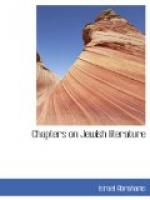The pamphlets which Manasseh published in England deserve a high place in literature and in the history of modern thought. They are immeasurably superior to his other works, which are eloquent but diffuse, learned but involved. But in his Vindiciae Judeorum (1656) his style and thought are clear, original, elevated. There are here no mystic irrelevancies. His remarks are to the point, sweetly reasonable, forcible, moderate. He grapples with the medieval prejudices against the Jews in a manner which places his works among the best political pamphlets ever written. Morally, too, his manner is noteworthy. He pleads for Judaism in a spirit equally removed from arrogance and self-abasement. He is dignified in his persuasiveness. He appeals to a sense of justice rather than mercy, yet he writes as one who knows that justice is the rarest and highest quality of human nature; as one who knows that humbly to express gratitude for justice received is to do reverence to the noblest faculty of man.
Fate rather than disposition tore Manasseh from his study to plead before the English Parliament. Baruch Spinoza was spared such distraction. Into his self-contained life the affairs of the world could effect no entry. It is not quite certain whether Spinoza was born in Amsterdam. He must, at all events, have come there in his early youth. He may have been a pupil of Manasseh, but his mind was nurtured on the philosophical treatises of Maimonides and Crescas. His thought became sceptical, and though he was “intoxicated with a sense of God,” he had no love for any positive religion. He learned Latin, and found new avenues opened to him in the writings of Descartes. His associations with the representatives of the Cartesian philosophy and his own indifference to ceremonial observances brought him into collision with the Synagogue, and, in 1656, during the absence of Manasseh in England, Spinoza was excommunicated by the Amsterdam Rabbis. Spinoza was too strong to seek the weak revenge of an abjuration of Judaism. He went on quietly earning a living as a maker of lenses; he refused a professorship, preferring, like Maimonides before him, to rely on other than literary pursuits as a means of livelihood.
In 1670 Spinoza finished his “Theologico-Political Tractate,” in which some bitterness against the Synagogue is apparent. His attack on the Bible is crude, but the fundamental principles of modern criticism are here anticipated. The main importance of the “Tractate” lay in the doctrine that the state has full rights over the individual, except in relation to freedom of thought and free expression of thought. These are rights which no human being can alienate to the state. Of Spinoza’s greatest work, the “Ethics,” it need only be said that it was one of the most stimulating works of modern times. A child of Judaism and of Cartesianism, Spinoza won a front place among the great teachers of mankind.




